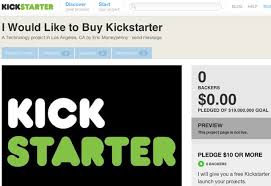 |
| Nice try. |
There's been a rash of Kickstarters lately connected to people and publishers I know, and I think it's worthy of comment. Double Fine's Kickstarter brought in a record of over $3.5 million to do an adventure game. Yes, an old-school, point-and-click adventure game, to be created by Tim Schafer and Ron Gilbert, who did games for Lucasfilm like Monkey Island and Grim Fandango. It's interesting to note that their proposal doesn't even describe what the game will be about. The fan base is so devoted to all of their old games they don't really care what a new game would be about, they just want to see one.
Similarly, Brian Fargo put Wasteland 2 up as a Kickstarter, and it's already broken through $1.5 million. People remember the original RPG, and want to see a sequel. Other Kickstarters are proposed for novels, tabletop RPG projects, and mobile games. More people on jumping on, looking for funding. I think there's some things to be aware of in order to have a successful Kickstarter campaign.
First off, Kickstarter has lots of advice, which you should take to heart. They have to approve your project, too, so that's a hurdle you have to pass. Make sure you do an excellent video; that's a key element in most successful proposals. It's your chance to make the pitch in the most compelling way possible. Use it well.
Now, some other considerations:
Have an audience. If you've got a big fan base, that's going to be a key element in success. If you know the size of your fan base, and can run some numbers ahead of time, you'll get an idea of how likely your Kickstarter is to succeed. If your lowest support level is (say) $10, and you have a fan base of 1,000 (based on previous sales, or members in your forums, or Twitter followers, or some such data), and you're asking for $5,000, you're likely to be disappointed. Why? Because you're expecting 50% of your followers to cough up money; that's a very high percentage. Something in the single digits would be more believable. Try to set yourself up to be pleasantly surprised on the up side; if you can make a go of it by getting 1% of your users to support at the lowest level, you're in good shape. But what if you don't have an audience? Then...
Be totally cool. Whatever your doing just has to be a cool concept. Maybe it's a gadget, or an RPG setting, or a movie, but when you explain it there's a lot of people who will go, "Ooh, me want." Don't expect a huge response if you're doing something obscure. If it takes you a long time to explain what it is and why it's cool, it's not compelling enough. If you can boil it down to a simple phrase, and everyone you tell that phrase to says "Wow," then you've got something.
Offer good value. Don't expect people to throw money at your project, even if it's totally cool and you have a big audience, if you're not offering a reasonable value. A paperback book for $50? Not a good value. A hardcover coffee-table book with gorgeous photographs or art for $50, signed by the author and photographer, in a numbered limited edition? A great value. It's all relative, so look at similar things on the market or available in stores to get an idea of reasonable pricing.
Be believable. If the audience doesn't believe you can deliver, they won't support it. Hopefully you have experience that will lead them to believe in your project, but make it explicit as to why you can deliver what you're promising. Also, can you do it in the time frame described, with anything or everything else you may have going on? Convince the audience of this.
Offer a wide range of benefits. More is better, I think. Check out a bunch of Kickstarters to see what kinds of things they are offering. Don't neglect the high end! You'd be surprised how much money some dedicated fans will come up with (some free-to-play games have sold in-game items for $10,000 or more!). Make sure you are ready and able to deliver on everything; don't offer dinner with yourself if you really don't want to have dinner with some random people, even if they are your fans.
I don't think this financing model will take over game publishing of any kind, but it certainly has a place. It's also good marketing for you and your company, if it's successful. So make sure it's a success!





